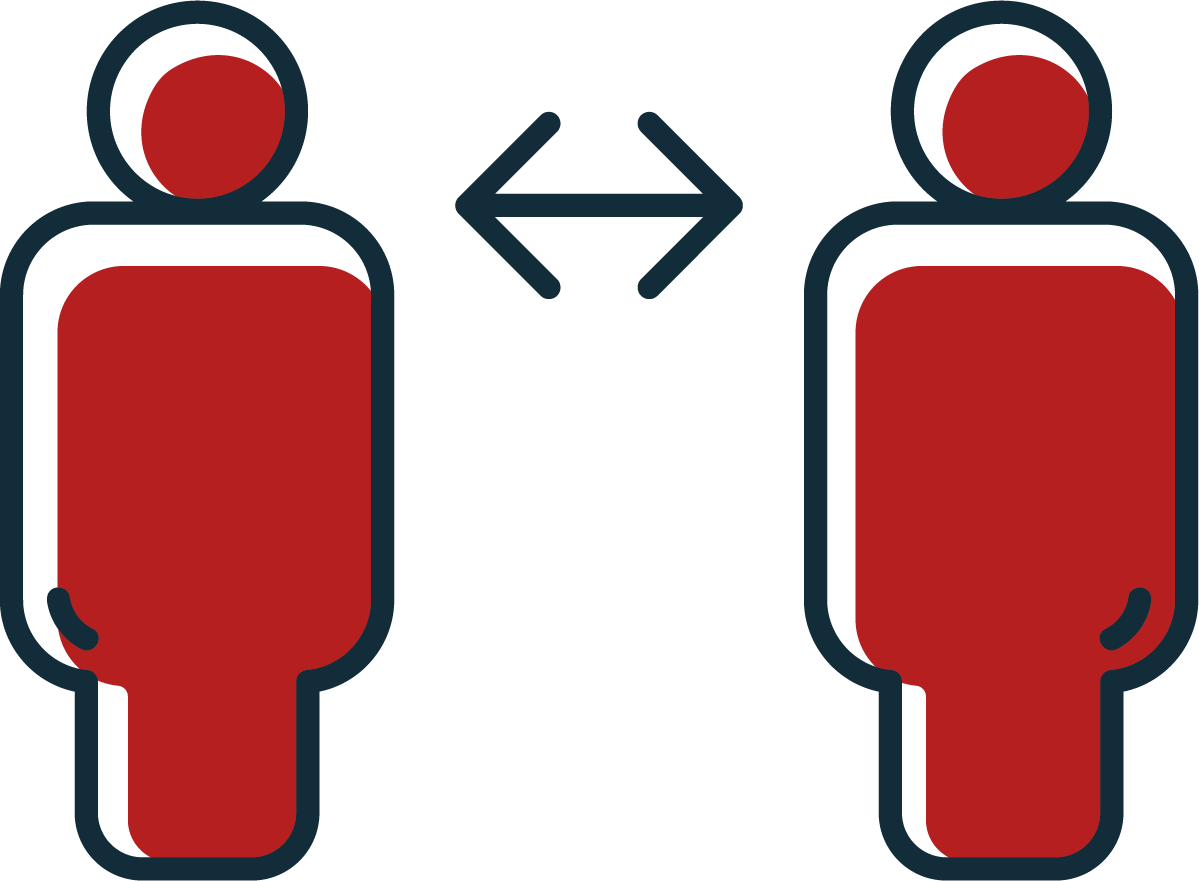The guidance below is provided to support the transition of employees within our teams and services back to what will be ‘normal.’ It is based on The Scottish Government Coronavirus (COVID-19): safer workplaces and public settings Guidance.
While the advice below relates primarily to COVID-19 and the workplace, it is also sound basic infection control, which will help us manage other common respiratory infection and diseases such as colds and flu.
Keeping safe is every employee’s responsibility and following the principles below will keep ourselves, our colleagues and communities safe.
Please ensure that you speak to your line manager if you have any questions about working safely.
View the Safer Workplaces Guidance below for further information.
Introduction
Following the lifting of legal restrictions for Coronavirus, this guidance is provided to support the transition of employees within our teams and services back to what will be ‘normal.’ It is based on Coronavirus (COVID-19): safer workplaces and public settings.
During the pandemic, services have been using service and sector specific COVID-19 risk assessments (RAs) in addition to their current tasks RAs.
As a Council we require to manage risk in our workplace. Considering COVID-19 routine measures as part of how our workplace operates can support our organisational resilience and the continuity of our operations, so we will continue to consider COVID-19 as part of our assurance procedures.
This guidance will:
- Update all COVID-19 risk assessments throughout council services.
- Health and Social Care Partnership Teams should follow this guidance and in addition, continue to apply Standard Infection Control Precautions (SICPs) and Transmission Based precautions (TBPs) for all supported individuals as required by Infection Prevention and Control (IPC) National Infection Prevention and Control Manual (NIPCM).
- Line managers are responsible for ensuring risk assessments are reviewed and that these and other safety and health related information is communicated to all their staff.
- Support SMART Working for the future and the use of Council buildings.
While the advice below relates primarily to COVID-19, it is also sound basic infection control, which will help us manage other common respiratory infection and diseases such as colds and flu.
Keeping safe is every employee’s responsibility and following the principles below will keep ourselves, our colleagues and communities safe.
Coronavirus, and other respiratory infections such as flu, can spread easily and cause serious illness in some people.
You should stay at home if unwell.
Rules on self-isolation can change at short notice, always check the latest guidance on NHS Inform Covid Information.
Working safely in our depots, offices and buildings
 We do not anticipate a notable increase in the number of staff accessing our depots, offices and buildings and we will continue to work safely as we have been during the pandemic.
We do not anticipate a notable increase in the number of staff accessing our depots, offices and buildings and we will continue to work safely as we have been during the pandemic.
Many good and hygienic working practices were introduced during this time and we will aim to continue these where operationally possible.
The use of offices will continue to be on the basis of the current bookable Covid-safe arrangements, with a clear-desk policy in place. Access Procedures for Council offices should continue to be used until SMART Working for the Future is rolled out.
As such, any requests must be authorised by the Executive Officer of the relevant area and Health and Safety Team contacted with details. This will not only limit the number of areas requiring enhanced cleaning, but also ensures numbers are defined to promote good ventilation and avoid overcrowding.
Space and Safe Distance
When working and meeting with people please stay at a safe distance away i.e. 1m is regarded as a safe distance. If you can keep a greater distance, you should.
Safe distancing will look different across services and previous RAs will inform how to best approach this change and implement it safely. The nature of the role also determines the need to work at close range. Other control measures should apply when close working is unavoidable.
 The Scottish Government has launched a Distance Aware scheme*, designed to help those worried about mixing with others as we adapt to living with COVID-19. The badges and lanyards let everyone around you know you need more space.
The Scottish Government has launched a Distance Aware scheme*, designed to help those worried about mixing with others as we adapt to living with COVID-19. The badges and lanyards let everyone around you know you need more space.
You can pick up a free Distance Aware badge or lanyard from all libraries across Scotland and in most Asda stores.
You can also order a badge or lanyard online.
The Council supports this scheme and in addition will continue to use individual risk assessments for those who have been on the Highest Risk List and may continue to feel more cautious or anxious about their health in the workplace. Line managers will have sensitive, supportive conversations with staff that consider their health, safety, physical and psychological wellbeing, as well as personal views/concerns about risks.
COVID-19 and other infectious diseases are primarily spread through close contact with an infected person who may or may not have symptoms. Sometimes the person won’t know they have COVID-19, but can still transmit the virus to others, even if fully vaccinated, so exercise reasonable caution at all times.
Consider how to keep a safe distance from others i.e. using space or if necessary screens and partitions between people in the workplace. Depending where you work, some of these practices are already well used and should continue where feasible. The desks used at our offices will continue to be used as per current arrangements.
The nationally established ‘Test and Protect’ programme has ceased however close contacts at work are still required to be identified to better manage cases locally. There is no need to panic or stop working if you think you have been in close contact with a colleague who is positive or showing symptoms, unless you are showing symptoms yourself. Here is a full list of COVID-19 and other respiratory symptoms. For any queries contact your line manager or the Health and Safety Team to discuss, on 0141 777 3210.

Outbreak Management
Where there is evidence of possible spread of infection in the workplace, Managers and Health and Safety Team will look at reducing the overall contacts between staff by adding specific control measures to the current routine ones for a short duration. For example this may include: encouraging hybrid working where possible, online meetings and conferences, maintaining staff bubbles/cohorts. This is only when there are more than two cases in one team.
Ventilation
 Provision of ventilation is linked to safe distancing. The more people in a room or space coming together, means more aerosol particles circulating, and needs more ventilation. This can be achieved by opening windows and even the door to allow fresh air in.
Provision of ventilation is linked to safe distancing. The more people in a room or space coming together, means more aerosol particles circulating, and needs more ventilation. This can be achieved by opening windows and even the door to allow fresh air in.
Maximise ventilation in offices, while travelling in Council vehicles, in meeting or welfare rooms as much as possible by keeping windows and where suitable, doors open (Fire doors must be kept shut). Where there is mechanical ventilation, we should make sure it is on even after leaving the room so it can continue to ventilate.
Use outside space if possible. Where there are small rooms with inadequate ventilation (i.e. small meeting rooms, toilets, kitchen areas), limit the number of people who are in the room at any one time. Most of our meeting rooms have a designated safe number that can be adapted to suit the activity and duration of use. We should avoid crowded spaces at work.
Congested Areas
Potential congested areas in your work area have been identified, such as narrow corridors, staircases, doorways, storage areas, kitchens, welfare canteens and toilets. Where possible minimise the number of people who can use these at one time or wait until some room users have left.
Our changing rooms and staff rooms should continue to have reduced numbers of people using them at the same time, with consideration of the above.
Face Coverings
The Scottish Government recommends the use of face coverings when in poorly ventilated, public or crowded spaces and on public transport. We would recommend their use in our Council buildings by all staff when in enclosed busy areas, pinch-points or places which are less well ventilated.
Contractors and visitors should follow the same guidance while entering our buildings to work. Members of the public visiting our public buildings should follow national public health advice and can choose to wear one.
Where risk assessments have identified a requirement for staff to wear a Type II Fluid Resistant surgical masks (FRSM) these will be supplied by the Council and must be worn.
Face masks – Fluid Resistant Surgical Masks (FRSMs) or type IIR
For HSCP teams, the recommendation that face masks are worn at all times is being removed. The PPE requirements for SIPCs and TBPs remain as before.
The key changes to the guidance are:
- Staff providing direct care do not need to routinely wear a face mask at all times during their shift
- Staff in non-direct care roles do not need to routinely wear a face covering in communal areas
- Staff and visitors may choose to wear a mask, and this should be supported.
- While receiving care and support, individuals (or their representatives where relevant) may wish a member of staff to wear a mask. If so, this should be supported by staff and be recorded in care or support plans
The fundamental principles of IPC precautions continue to be essential. Going forward, the use of FRSMs by HSCP staff should be a person-centred, risk-based approach.
This means there will continue to be situations where the Health Protection Team or Infection Prevention and Control Team may advise on the reintroduction of mask wearing, in cluster or some outbreak situations. In addition, staff may
recommend mask use in certain situations deemed to pose an increased risk, for example where there is poor ventilation, crowding, or risk of splash of blood, body fluids, secretions or excretions onto the nose and mouth, as per SICPs. This is to minimise the risk of the spread of infection, including COVID-19, in social care settings.
We understand for some there may be concern with this change in guidance and therefore a person-centred approach should be adopted. You can watch a video about the changes to the guidance on face mask use in social care settings.
Cleaning/Hygiene
Wash or sanitise your hands regularly using both soap and water, or hand sanitiser. We will continue using Clean as you Go in our Council offices, buildings and depots.
Staff using the bookable Covid-safe office space will be personally responsible for the cleaning of workstations and work surfaces prior to and after their use. This includes taking responsibility for disposing of any rubbish and ensuring all personal belongings are taken away at the end of the day. Virucidal spray and blue roll or anti-bacterial wipes will be supplied for the cleaning of work surfaces along with hand sanitiser for staff personal hygiene. If cleaning materials are not available please contact local FM staff.
Facilities Management staff will clean buildings using an enhanced regime, out with that employees are responsible for keeping their own social areas clean by wiping down desks, work surfaces and tables clean before and after use.
You should also pay particular attention to shared items such as work equipment and tools, photocopiers, kettles, water dispensers etc.
Disposing of waste
Normal cleaning material waste can be discarded in the regular bin. Please make sure any waste is discarded according to recycling and disposal guidelines for specific items such as plastic, glass and paper.
Disposing of waste including any materials and PPE used for cleaning where there has been an identified COVID-19 positive case must be double bagged.
Travelling in Vehicles
Travel safely when going to and from the workplace. You should not travel to work or car share if you have symptoms of COVID-19.
Vehicle sharing at work involves close contact with other individuals. Avoid using vehicles to their maximum capacity – more people together means more aerosol particles circulating, and so needs more ventilation therefore, you should:
- Wear a face covering or Type IIR Fluid Resistant Surgical mask (FRSM) for the duration of your journey. It should be noted that FRSMs must be worn during vehicle journeys if it is a requirement for the risk assessment for your role.
- Ensure vehicles are well ventilated by opening windows, if cold or rainy weather, part of the window can be left open to aid ventilation and the extract system of the vehicle set to not recirculate air.
- Sanitise or wash hands before and after the journey.
- Clean all frequently touched surfaces like steering wheels, gear sticks, door handles, and consoles before and after journeys with a disinfectant wipe or spray.
- Try to travel with and work with the same people as far as possible.
- Sit further away from one another as possible, if vehicle has space.
Screens have been installed in some operational vehicles. Where possible these should stay in place.
Please note that depending on the number of people in the vehicle and its operational use, screens may be removed to support ventilation at the back of the cabin, where windows are not present or not able to open and where the
seats in the rear are used.
First Aid and Fire Safety
 Employees should be made aware of the current first aid and fire safety provisions and should familiarise themselves with their workplace procedures, as these might be slightly different per location.
Employees should be made aware of the current first aid and fire safety provisions and should familiarise themselves with their workplace procedures, as these might be slightly different per location.
Protecting People
Keep regular communication with your employees. Remind people of the steps they should be following. Ensure that there are no unintended impacts on people with disabilities or caring responsibilities.
While those who were on the Highest Risk List can follow the same mitigations as others, individual risk assessments should still be carried out to ensure that we are doing all we can to protect them.
Anyone experiencing COVID-19 symptoms will be advised to stay at home as advised by NHS inform thus minimising mixing with others.
Continue to try to reduce the overall contacts between people by encouraging hybrid or flexible working where possible and online meetings.
Keep working and communicating with staff, or staff representatives, on health and safety matters such as risk assessment reviews, training around any new ways of working and protocol and any staff concerns in relation to the changes and easing of restrictions.
A number of resources to support wellbeing and good mental health of staff whether working from home, in the office or elsewhere is also available.
Working with Display Screen Equipment (laptops, touchscreens and other devices)
 We have four SMART workstyles across the Council. All employees using display screen equipment (DSE) such as laptops, desktop PCs or other devices, regardless of workstyle, would benefit from completing a DSE self-assessment form. The form helps identify risks commonly associated with the use of DSE and ensure our workstations are suitable for keeping good overall health and wellbeing while maximising our productivity.
We have four SMART workstyles across the Council. All employees using display screen equipment (DSE) such as laptops, desktop PCs or other devices, regardless of workstyle, would benefit from completing a DSE self-assessment form. The form helps identify risks commonly associated with the use of DSE and ensure our workstations are suitable for keeping good overall health and wellbeing while maximising our productivity.
Our bookable desk spaces have adjustable office chairs and monitors to support good posture and workstation set-up while using DSE.
If working from home or at an alternative site, there are other aspects to consider for health, safety and wellbeing and a different form should be used, which considers your work environment, electrical and fire safety, mental health and
wellbeing while physically away from colleagues and the workplace.
The Employee Zone has all the information you need to work safely from home, including DSE self-assessment forms, How to Guides, E-Learning modules, tips on how to set-up to avoid long-term injury and workstation exercises.
Keep in mind
The health of all employees, of yourself and of your colleagues, is a priority. Managing the risk of transmission of Covid-19 in the workplace takes a combination of measures and no single measure can be risk free. The more precautions taken to reduce transmission, the safer our working environment will be.
Useful Contacts
Health & Safety Team 0141 777 3210 or Health.Safety@eastdunbarton.gov.uk